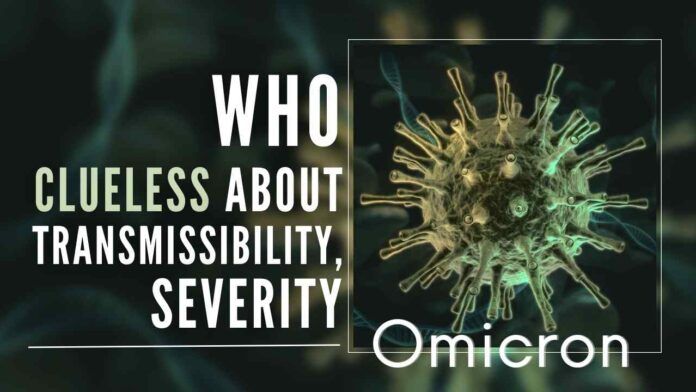
Omicron variant transmissible? WHO not clear
Scientists across the globe including the World Health Organization (WHO) are not yet clear whether the Omicron COVID-19 variant is more transmissible, or causes more severe disease compared to other variants, including the Delta variant.
Researchers in South Africa and around the world are conducting studies to better understand many aspects of Omicron and will continue to share the findings of these studies as they become available.
WHO encourages countries to contribute to the collection and sharing of hospitalized patient data through the WHO COVID-19 Clinical Data Platform to rapidly describe clinical characteristics and patient outcomes.
The WHO said on Sunday, “It’s not yet clear whether Omicron is more easily spread from person to person compared to other variants, even though the number of people testing positive has risen in South Africa where this variant was involved.”
WHO confirmed that there is currently no information to suggest that symptoms associated with Omicron are different from those from other variants, as understanding the level of severity of the Omicron variant will take days to several weeks.
The Xinhua news agency reported that it is yet not clear whether Omicron causes more severe disease, but preliminary data suggests that there are increasing rates of hospitalization in South Africa, which however may be due to the increasing number of people becoming infected.
All variants of COVID-19, including the Delta variant that is currently dominant worldwide, can cause severe disease or death, in particular for the most vulnerable people, and thus prevention is always key.
However, WHO said preliminary evidence suggests there may be an increased risk of reinfection with Omicron but the information is limited. More information on this will become available in the coming days and weeks.
It added that current PCR tests continue to detect Omicron while further studies are still going on to understand how the Omicron variant will impact available vaccines and treatments to COVID-19.
WHO classified on Friday the latest variant B.1.1.529 of the SARS-CoV-2 virus, now with the name Omicron, as a “Variant of Concern” (VOC).
According to WHO’s definition, a VOC, with a degree of global public health significance demonstrates one or more mutational changes such as an increase in transmissibility or detrimental change in COVID-19 epidemiology, increase in virulence or change in clinical disease presentation, and decrease in the effectiveness of public health and social measures or available diagnostics, vaccines, and therapeutics.
WHO has since urged countries to enhance surveillance and sequencing on circulating SARS-CoV-2 variants, submit complete genome sequences and metadata to a publicly available database, and report initial VOC cases or clusters to WHO.
It has also recommended field investigations and laboratory assessments to better understand the potential impacts of the VOC on COVID-19 epidemiology, the effectiveness of public health and social measures, and antibody neutralization.
[With Inputs from IANS]
PGurus is now on Telegram. Click here to join our channel and stay updated with all the latest news and views
For all the latest updates, download PGurus App.
- ‘Won’t get involved’, says US on PM Modi’s ‘Ghar Me Ghus Ke Maarenge…’ remark on terrorism - April 17, 2024
- Jharkhand: ED arrests four more persons in land scam case - April 17, 2024
- NDA to retain power with thrice the number of seats than I.N.D.I.A bloc: TV9 Bharatvarsh, Polstrat and People’s Insights - April 17, 2024











Keep that hype…….Well done WHO……… meanwhile keep thinking what is next flipflop